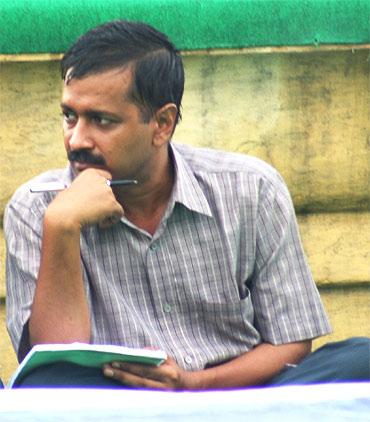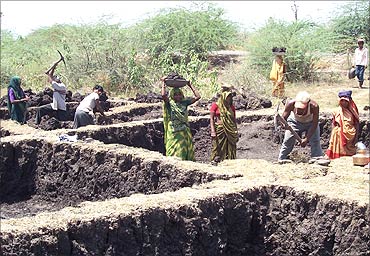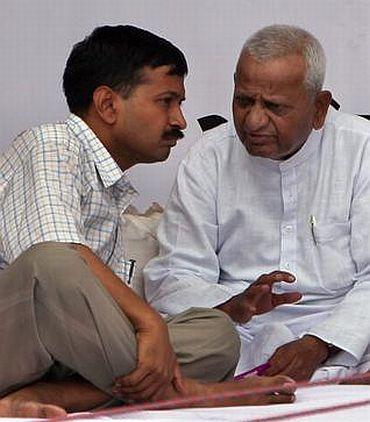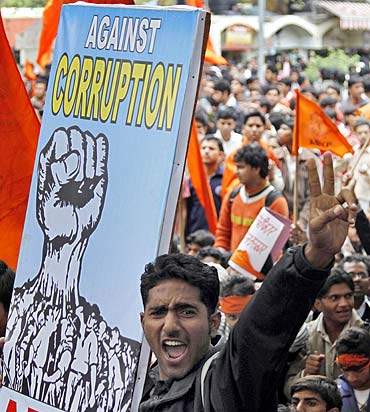
This week the parliamentary Standing Committee on the Lokpal bill will submit its report, in record time, to Parliament. Arvind Kejriwal, a member of Team Anna, discusses the parameters of his possible objections to the report.
Kejriwal spoke exclusively to rediff.com's Sheela Bhatt and was making his final position clear. Before the third round of agitation against corruption begins in the last week of December read the logic and passion behind it in this the first of a two-part series.
On the news coming out on the Standing Committee's report:
Prime Minister Manmohan Singh has assured us through his letter of October 10 to Anna Hazare that we will have a strong Lokpal bill. It's a letter from the prime minister and we believe in his assurance. The matter is before the Standing Committee. But the news that is filtering out of the Standing Committee is disappointing.
On the crucial issue of bringing the CBI under the Lokpal:
They are saying that Central Bureau of Investigation will be kept out of the Lokpal therefore it means that the CBI's administrative and financial control would remain with Department of Training and Personnel in the government. So, effectively CBI will be controlled by the government as it is being controlled today.
The Lokpal would receive complaints of corruption from the people, forward it to the CBI for investigation, the CBI would investigate under the influence of government, forward its report to the Lokpal and the Lokpal will take it to the court.
So effectively Lokpal becomes a post office. It has no role to play. It will be a glorified post-office. Why have such a Lokpal?
Because the investigation is the crux in any anti-corruption case and if the investigating body is going to be outside the Lokpal's purview, then the Lokpal has no meaning.
Second, we had always said that the corruption in the judiciary should be brought within the purview of the Lokpal. The government initially said that we want to bring it through a separate bill. So we said okay you bring it through a separate bill. Now they have brought the judiciary accountability and standards bill.
Now corruption in the judiciary is neither covered under the Lokpal nor covered under the judiciary accountability bill. So, effectively now the judges would be free to take bribes but there will be no 'body' which would have the powers to investigate their corruption. In a way you are saying that judiciary would have the licence to indulge in corruption.
...

On concerns over the independence of the judiciary:
Today an ordinary police officer can register an FIR against the Supreme Court. So is the judiciary's independence affected by that? If, instead of a policeman investigating it, you give the case to Lokpal, how is the independence of the judiciary going to be affected? This argument is not valid.
But in any case we have been telling them if you want to bring it through a separate bill and a separate body, we have no problem. So they brought a judicial accountability and standards bill in which there is no mention of criminal investigation of judges under the Prevention of Corruption Act.
So effectively if a high court or a Supreme Court judge takes a bribe, an FIR cannot be registered either by the Lokpal or under the judiciary accountability bill, so they're free to take bribes.
The government is confusing people on the issue by saying that they will bring another bill under which judges will be investigated. How long can you trust these people?
On dealing with the bureaucracy:
We had been insisting on inclusion of the entire bureaucracy under the Lokpal. The Anti-Corruption Bureau of the police does not provide a solution to people who face harassment from government servants. If the ACB's had been providing a solution, why would we be talking of this huge war against corruption?
The police do not have sufficient manpower to register cases of even murder and rape. If the ACB had been so effective, we would not have asked for an independent body called the Lokpal.
Also, there is a direct conflict of interest because the ACB of the police is directly controlled by the very same people against whom you're filing cases. So, effectively all the inspectors of all the departments are group C officers.
You know how Rs 30,000 crore worth of rations is siphoned off every year? This is done by group C and group D officers. The MNREGA scheme is being misused. Some experts put corruption figure as high as Rs 50,000 crore. All the panchayat level corruption is done by group C and D officers.
This is a huge amount of corruption you are leaving out if the entire bureaucracy is not kept under the Lokpal. One should not give the argument that if the entire bureaucracy is included under the Lokpal, the institution will become unwieldy.
We need to understand that we are a huge country of 120 crore people. Any government which comes to power should come with the sense of responsibility to govern such a huge country. They should not get overawed by the size of the country.
They have to govern 120 crore people. There are 4 million central government employees and 20 lakh public sector employees. That makes 60 lakh government servants who should be answerable to someone if they don't serve the people.
Should we let them indulge in corruption just because a large number of anti-corruption staff would be required to keep a check on them? That is not a valid argument. Till now in our country we had a huge vacuum in our anti-corruption setup.
You'll be surprised to know that when we were helping the Uttarakhand government in drafting the Lokayukta bill, we were told there were hardly 3 or 4 persons in their anti-corruption branch and in the state vigilance department put together.
So an entire state has just 3 or 4 people in their anti-corruption wing. In the Delhi police, you have 85,000 police officers and just 15 vigilance officers. That is the kind of vacuum that exists in this country's anti-corruption setup. We need to fill up that vacuum.
To check the corruption of 60 lakh employees, according to international standards, we need a work force of 30,000 people in the anti-corruption body. Now 30,000 staff is not such a huge government department.
The railways, postal, excise, income tax, all these departments have a workforce of more than 30,000. So why are we getting over-awed by this 30,000 figure? 30,000 is a middle-sized central government department. We need to create an anti-corruption force.
...

On the protection of whistle-blowers
If as soon as I make a complaint to the Lokpal as a citizen, I start receiving threats and I'm victimised and attacked, logically, the Lokpal should provide me protection. This is what we had suggested in the JanLokpal Bill. The Lokpal should be given resources, manpower and powers to be able to do that.
However the government is saying that we'll bring a separate whistle-blowers protection bill. It's already been introduced. In that bill they are giving this job to the Central Vigilance Commission. The CVC does not have any jurisdiction over the politicians.
So if I'm raising my voice against my local Member of Parliament, what will the CVC do? It does not have jurisdiction over the MP.
The CVC does not have any powers to take any action against anyone. It is an advisory body. The CVC has been given responsibility to provide protection to whistle-blowers by the Supreme Court in 2000-2003 and since then, the CVC has not provided protection to even a single whistle-blower.
In the last one year, 13 whistle-blowers have been murdered in this country. The CVC could not provide protection to any one of them. There are large number of people who have been put behind bars on false and flimsy cases because they dared to file RTI applications.
The CVC could not provide protection to any one of them. There are a large number of people who have been thrashed and victimised and the CVC could not provide protection to them. So this whistle-blowers protection act, suggested by the government, is also a showpiece legislation which will effectively mean nothing to the whistle-blowers. If it is under Lokpal then the whistle-blowers would feel safer.
...

On public grievances
We had suggested that a citizen's charter should be brought under the purview of the Lokpal bill.
The government says we'll bring it through a separate bill. Now the separate bill that the government has drafted says that there will be a citizens charter which will say what work will be done by which officer, in how much time and if that officer does not do that job then it goes to the head of that department, if the head also does not do that job then there will be a state public grievance commission stationed in the state capital which will have five members.
So you file your complaint to the state public grievance commission and if that also doesn't satisfy you, there will be a central public grievance commission stationed in Delhi with five members.
So if you are a resident in a remote village in Karnataka and you've not got your ration card, you will come to Bangalore to file your complaint in the state public grievance commission.
So all the grievances of all the departments, of all the villages, of all the cities, the grievances of all the people of Karnataka, will be solved by these five people sitting in Bangalore.
And if they are not able to do it then all the grievances of all the people of India, i.e. 120 crore people of this country will be solved by the five people sitting in Delhi. It is completely unworkable. Within three days these state bodies and central body will collapse under their own weight.
We needed a highly decentralised system. What we had suggested to the government and what has now been implemented by Uttarakhand is a brilliant model.
Secondly, in the government's model if the head of the department doesn't do his job, he doesn't face any penalty. And the penalty clause on the original officer in the department is very vague. There will effectively be no penalty.
What the Uttarakhand government has suggested is that if head of department fails to do the job, then in every district there will be a judicial officer of the Lokayukta.
Say, if you file your complaint to the district level judicial officer in the Lokayukta then, it will be the duty of the judicial officer to impose a penalty (if proven guilty) on the head of the department and that particular officer (against whom you have filed the complaint). The money will be taken out of their salary and will be given to you as compensation.
And if there is a repeated violation of the citizen's charter then this judicial official would also initiate proceeding for the dismissal of these officers and also it will be deemed to be a case of corruption.
So there is a very heavy deterrent if the grievance is not solved within the department. The head of the department would ensure that he tries to settle the grievance within his own department.
If, the grievance goes out of his department to the Lokayukta then heads would roll, penalties would be imposed and this is a very heavy deterrent. Unless you provide that kind of a highly decentralised system at block level and district level, this centralised system proposed by the government will not work to stop corruption or delays.
So, effectively what the government is saying; public grievances are out of the Lokpal, CBI is out of the Lokpal, judiciary is out of the Lokpal and if reports are to be believed even some parts of the bureaucracy. So the Lokpal is going to be effectively an empty tin box which is not a deterrent.
Many people tell us that in government few things are possible, few other things are not. We are saying we want freedom from corruption. You are saying it's not possible under the given system of governance.
We don't want to take no as an answer. We will keep on our movement till we drive out corruption from our daily life. Our minds are open to the issues but I want arguments, I don't want judgments.
Don't miss part two of the interview next week.